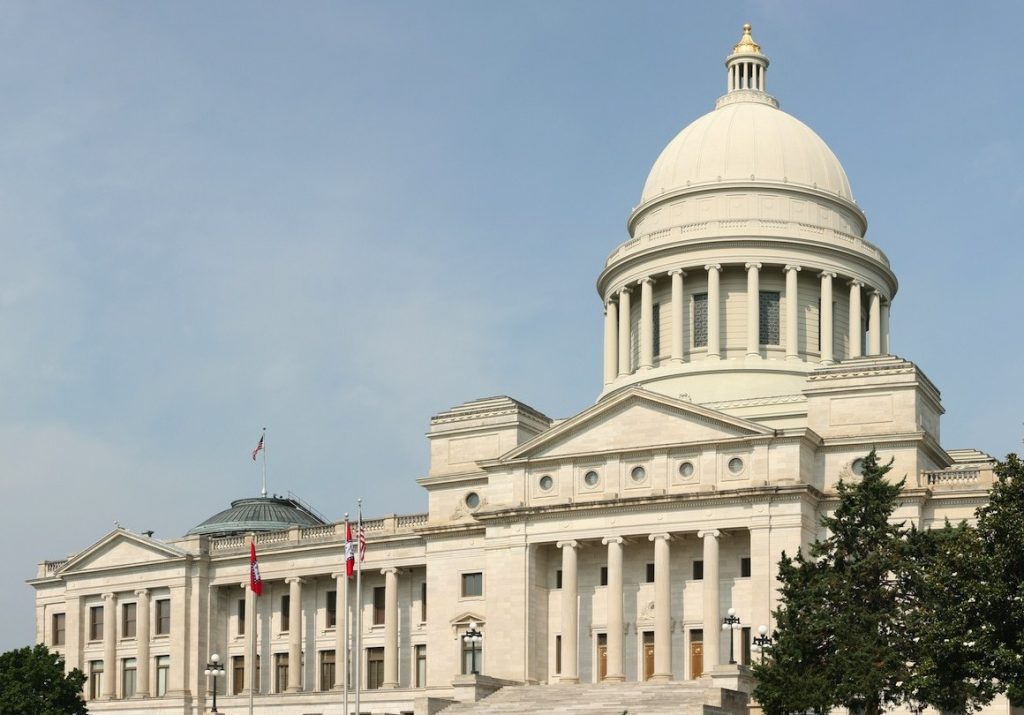The divisive battle in Little Rock, Arkansas over the alternative to Medicaid Expansion – popularly known as the Private Option – should make any Red state legislature weary of attempting a similar strategy. The fight has seen a faction of conservative lawmakers – backed by the Arkansas State Chamber of Commerce (they themselves armed with a horrendously flawed study by tax-prep firm Jackson-Hewitt) – struggle to gain the three-fourths majority needed to fund the program they enacted just last year. On the other side of the battle are a band of conservative lawmakers who voted against enacting Medicaid Expansion last year – and their numbers are growing. To put it bluntly, the fight over the Arkansas Private Option is an intra-conservative-family fight.
The 2012 elections saw Republicans sweep into power in both of state legislative houses in Arkansas. While the new Republican majority in the state senate was significant, House Republicans managed to take the majority by only one vote. This slim majority helped create the environment for a showdown with Democrat Governor Mike Beebe over whether the state would expand Medicaid under Obamacare (the Affordable Care Act). Fearing executive action to expand Medicaid, Republican lawmakers cobbled together what they deemed a conservative alternative to outright Medicaid Expansion. The Private Option was born.
Fast forward to today. The coalition of establishment Republicans, conservatives, and Democrats who enacted the Private Option has fractured. Between the disastrous Obamacare rollout and the projected sky-rocketing costs of the Private Option, some lawmakers in Little Rock are fleeing for the exits. The State House failed by two votes to meet the threshold to fund the Private Option on Tuesday. In the State Senate, Sen. Missy Thomas Irvin, once a Private Option proponent, has abandoned the program – opting instead to side with the coalition of conservatives now pushing to defund the program.
But what just are the arguments against the so-called “conservative alternative” to Medicaid Expansion?
The largest objection to the program is cost. Under Obamacare, the Federal government offers a Medicaid match with the Feds paying 100 percent of the new costs at first. Then after 2017, the state would slowly take on more of the cost until 2020 – when the Feds would assume 90 percent of the cost and the state only 10 percent. Having the Federal government pick up most of the tab sounds nice; especially when the Arkansas Department of Human Services estimates that with the Private Option, Medicaid in Arkansas will cost nearly $400 million by 2023. But there-in-lies the problem, the odds of the 90-10 match remaining in place as the Feds tighten their own belts are slim to none.
Congressman Paul Ryan (R-Wis.) has pointed out, “The fastest thing that’s going to go when we’re cutting spending in Washington is a 100 or 90 percent match rate for Medicaid. There’s no way. It doesn’t matter if Republicans are running Congress or Democrats are running Congress. There’s no way we’re going to keep those match rates like that.” The Associated Press noted that even Jerry Brown – the Democrat Governor of California – when faced with his own fight over Medicaid Expansion had concerns over the Federal match, “The Brown administration wants to be able to get out of covering this expanded population if the federal government ever lowers its 90% Medicaid match.”
In defense of the Private Option, the Arkansas Chamber of Commerce released a study by the tax-prep firm Jackson-Hewitt claiming that without Medicaid Expansion, Arkansas businesses would see a tax increase between $27 and $40 million. Already, the study has been exposed as little more than fear mongering.
First, the base assumption of the study is that no employer in the state would provide insurance coverage to an employee who would qualify for Medicaid if expansion were to occur – yes, it assumes zero, zilch, none. That is a wildly irresponsible assumption. Why not assume that businesses would cover 100 percent of qualifying employees?
Secondly, Jackson-Hewitt has skin in the game. The major tax preparation firms across the United States are acting as Obamacare navigators and in some cases offering monetary bounties for each person a tax-prep specialist enrolls in Obamacare. One tax preparation specialist told me that his firm offered $50.00 a scalp.
The Arkansas Chamber/Jackson-Hewitt study should be ignored two-fold. It is both flawed and biased.
Where does that leave, then, the Arkansas Private Option? Lawmakers could choose to leave the program in place and risk busting the state budget as the Federal match inevitably disappears – leading to massive tax increases on individual taxpayers and employers across the state. Arkansas lawmakers could do the fiscally responsible thing and vote down any further attempts to fund the Private Option.
William Upton is State Affairs Manager at Americans for Tax Reform.



